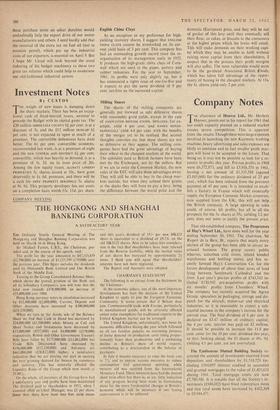Investment Notes
By CUSTOS
MHE weight of new issues is damping down I the share markets. There has been an excep- tional rush of fixed-interest issues, anxious' to precede the Budget with its capital gains tax. The £20 million MIDDLESEX COUNTY 61 per cent. is at a discount of 5s. and the £12 million DUNLOP 61 per cent, is not expected to open at much of a premium. The convertible debentures have done better. The 64 per cent. convertible SUMMERS. recommended last week, is at a premium of eight and the new CENTRAL AND DISTRICT 61 per cent. convertible, which was heavily in demand, is at a premium of 3s. 3d. on its issue price of 20s. Among the few equity issues, ALLNArr LONDON PROPERTIES Ss. shares, issued at 105., have gone deservedly to Is. 6d. premium, and there will be a rush for IMRY PROPERTY HOLDINGS 5s. shares at 95. 9d. This property developer has net assets on a completion basis worth I Is. l Id. per share.
English China Clays
As an exception to my preference for high- yielding recovery shares, I suggest that ENGLISH CHINA CLAYS cannot be overlooked on its cur- rent yield basis of 3 per cent. This company has had an outstanding growth record since the re- organisation of its management early in 1957. It produces the high-grade china clays of Corn- wall which are used in the paper, pottery and rubber industries. For the year to September, 1961, its profits were only slightly up, but it has announced a rights issue of one-for-five and it expects to pay the same dividend of 9 per cent. tax-free on the increased capital.
Milling Shares
The shares of the milling companies are generally put forward as safe defensive shares with reasonably good yields, except in the case of ASSOCIATED BRITISH FOODS. SPILLERS, for ex- ample, yield 4 per cent. and RANKS HOVIS- mcDouGALL• yield 4.4 per cent. with the benefits of the merger yet to be realised. But second thoughts convince me that these shares are not as defensive as they appear. The milling com- panies have had the great advantage of buying their wheat in the cheapest markets of the world. The subsidies paid to British farmers have been met by the Exchequer, not by the millers, But if we are to enter the Common Market, the new rules of the EEC will take these advantages away. They will still be able to buy in the cheap mar- kets outside, but when they unload their grains at the docks they will have to pay a levy, being the difference between the world price and the domestic (European) price, and they will be out of pocket of this levy until they eventually sell their flour, or cakes, or biscuits to the consumers at the higher prices which the levies will entail. This will make demands on their working capi- tal which they may be unable to fulfil without raising more capital from their shareholders. I suspect that in the process, their profit margins will also suffer. The most vulnerable would seem to be the go-ahead Associated British foods, which has taken full advantage of the oppor- tunity of buying in the cheapest markets. At Its. the Is. shares yield only 2 per cent.


































 Previous page
Previous page